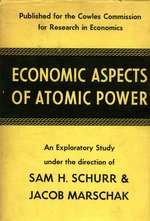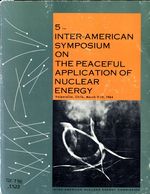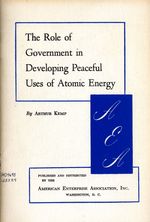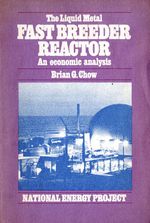As the conversation broadened to include corporate access to atomic energy, scientists and politicians began to wonder about the possible effects of atomic energy on the American economy.1 Power plants were the most obvious peacetime application of nuclear science. As scientists and politicians began to discuss powering American cities not with hydropower or coal but with nuclear reactors, the effect on the economy became a central question.
The idea of using nuclear power to replace less efficient models such as coal and oil proffered ramifications that the American public, dazzled by the promise of futuristic new technology, hadn't considered. Not only would this change threaten coal miners and oil drillers, it could also impact the railroads, shipping lines, fuel vendors, and power plant operators that existed solely to service these traditional power sources. Alternatively, thousands of jobs in construction, industrial manufacturing, and chemical treatment would be created for use in the building and maintenance of an atomic nation.
Politicians, scientists, and experts in dozens of fields found themselves overwhelmed by the implications of atomic energy. The logistical responsibilities that accompanied the title of "first nuclear nation" were enormous and the task of solving them daunting. The pressure put on the U.S. by other nations was even more oppressive.
Ultimately, the AEC worked in conjunction with the United Nations and other European bureaucratic organizations to establish extensive safety and control policies including limitations on nuclear testing, the dissemination of nuclear technical information, and collaboration between the government and the private sector.2 The struggle to effectively control nuclear energy processes without hindering innovation and discovery continues even today, more than sixty years after the first item of nuclear legislation was passed in the United States.3
Notes
- 1580. Progress in Nuclear Energy. Series VIII. The Economics of Nuclear Power, including Administration and Law. Ed. J. Gueron, J.A. Lane, I.R. Maxwell & J.R. Menke. New York or London: Pergamon, etc, 1957-1959. HD9698.A2 E19. Return to text ↑
- 1569. Nuclear Energy Costs and Economic Development. Proceedings of a Symposium in Istanbul, 20-24 October 1969. Vienna: IAEA, 1970. TK9153 .S9 1969. Return to text ↑
- 1595. The Technical Basis for Legilsation on Irradiated Food. Report of a Joint FAO/IAEA/WHO Expert Committee Rome, 21-28 April 1964. Geneva: World Health Organization, 1965. Return to text ↑




